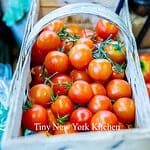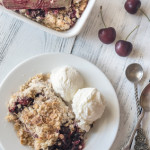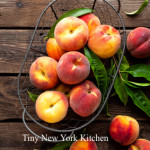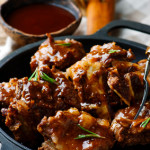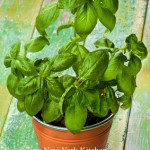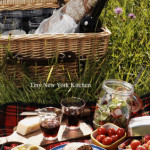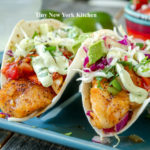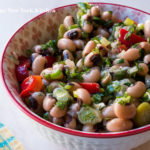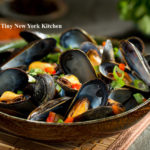You won’t find any high-fructose corn syrup at the farmers’ market. You also won’t find any elaborately processed food products, any packages of long lists of unpronounceable ingredients or dubious health claims, anything microwavable, or any old food from far away. What you will find are fresh, whole foods that are harvested at the peak of their taste and nutritional quality, which is precisely the kind your great-grandmother or even your Neolithic ancestors would easily recognize. The kind that is alive and eventually will rot.
“Work With What You Got!”
©Tiny New York Kitchen © 2019 All Rights Reserved
When You Have Leftover Crumble Serve It For Breakfast With A Dollop Of Greek Yogurt.
Stone fruit is at its peak during the summer.
Look for fruit without any bruises, cuts, or soft spots.
Peaches bruise easily – hold in the palm of your hand to check ripeness instead of squeezing.
Give a sniff. Ripe fruit has a fragrant scent that makes you want to take a bit.
Ripen peaches by storing in a paper bag for 2 to 3 days at room temperature out of direct sunlight.
Keep cherries in the refrigerator.
All stone fruits offer good-for-you fiber and antioxidants.
Stone fruits are low in calories.
Peaches are a great source of vitamins A and C.
“Work With What You Got!”
©Tiny New York Kitchen © 2019 All Rights Reserved
I’ve never met a sausage that I didn’t like, but these are the best “in-bun” choice for your summer grilling. Go to recipes to find out how to makes this delicious summer treat.
“Work With What You Got!”
©Tiny New York Kitchen © 2019 All Rights Reserved
Happy Independence Day!
You may substitute any berries for this delicious mug cake.
“Work With What You Got!”
©Tiny New York Kitchen © 2019 All Rights Reserved
To make delicious grilled baby back or spare ribs bake them a day or two in advance. Precooking ribs tenderizes the meat and shortens cooking time. Leave them in the refrigerator for a day or two after precooking them and the flavor develops even further.
Remove ribs from refrigerator 1 hour before cooking and let sit at room temperature.
Preheat oven to 350 degrees.
Season ribs on both sides with kosher salt or a favorite spice rub.
Wrap each rack in 2 layers of foil.
Place ribs in roasting pan. Place in oven and bake 2 hours for baby back ribs or 3 hours for spare ribs (until tender).
Remove from oven and let cool to room temperature. Place in refrigerator for 30 minutes and up to 3 days.
Finish ribs by cooking them 7 to 10 minutes on grill heated to medium. Baste ribs frequently with your favorite sauce.
“Work With What You Got!”
©Tiny New York Kitchen © 2019 All Rights Reserved
Fresh basil can be dried, but freezing holds the flavor better, and there are two easy methods.
1. Freeze Whole Leaves: Blanch basil leaves in boiling water for two seconds and immediately place in an ice bath. Dry the leaves completely, then place in a freezer-safe container, layered with parchment paper or wax paper, and freeze up to four months. For the best flavor, do not thaw before using.
2. Purée And Freeze: Remove the leaves from the stems and wash and dry them. In a food processor, purée the leaves with olive oil (use about a tablespoon of oil per cup of basil). Freeze the purée in ice cube trays, then transfer to a resealable plastic bag and freeze up to four months. To purée works best in soups, stews, and sauces.
“Work With What You Got!”
©Tiny New York Kitchen © 2019 All Rights Reserved
Organic crops, grown without recourse to synthetic fertilizers and pesticides, are credited with miraculous properties by many of their fans. Unfortunately, there is little scientific evidence that they are more nutritious than those produced by conventional means. But their supporters argue that the methods used to raise them bring other benefits, too. And here they may be correct. That, at least, is the conclusion of a study by Matthew Jones of Washington State University, which he has just published in the Journal of Applied Ecology.
Contamination of fresh produce with bacteria-laden wild animal feces is a problem in many places. For this reason, farmers often remove hedgerows, ponds, and other habitats to discourage visits by such animals. That is necessarily detrimental to wildlife, and also requires the application of more pesticides because it reduces the number of insectivorous birds and mammals around. Dr. Jones speculated that an alternative way of dealing with animal feces would be to encourage dung beetles to bury it and bacteria to break it down, and that this encouragement might be an automatic consequence of organic farming.
To test this theory, he and his team dug pitfall traps, baited with pig feces to lure dung beetles, in 41 broccoli fields on the west coast of the US (a region that grows well over a third of America’s fresh produce). They also collected soil samples from the fields in question. The western part of the US has been the source of several outbreaks of food poisoning caused by toxin producing strains of E. coli, a gut bacterium. Research suggests these are linked to contamination by wild boar feces (hence the choice of pig feces as the lure). Dr. Jones focused on broccoli because it is frequently eaten raw, and is thus likely to carry live pathogens into the human gut.
Of the fields in the study, 15 were farmed conventionally and 26 organically. Dr. Jones and his colleagues found from their traps that organic farms did indeed foster large dung beetle populations, which removed significantly more pig feces over the course of a week than did beetles, dwelling on conventional farms.
To establish whether high beetle numbers and good microbe diversity really did result in fewer disease-causing bacteria, the researchers followed up their field work with laboratory experiments. In one such they presented three species of dung beetles with pig feces that had been inoculated with a cocktail of harmful strains of E. coli. One of these species, Aphodius pseudolividus, had no effect on those strains. But the other two, Onthophagus Taurus and Onthophagus nuchicornis, reduced pathogenic E. coli numbers by 90% and 50% respectively.
In a second experiment the researchers preented microbes from the various fields with the same fecal mix. This showed that the bacterial floras of organic farms were much more effective at suppressing dangerous strains of E. coli than those of conventional farms. The order of business, then, seems to be that beetles bury the dung and soil bacteria render it harmless. Big points for organic farming.
“Work With What You Got!”
©Tiny New York Kitchen © 2019 All Rights Reserved
The word picnic was originally a 17th Century French word, picque-nique. Its meaning was similar to today’s meaning: a social gathering where each attendee brings a share of the food.
Going on a picnic sounds like a great idea, but it might feel a bit daunting if you haven’t been on one in a long time. Deciding what to eat, where to go and what supplies to take can seem like a big confusing task. Take away any picnic apprehension with some easy pre-planning and a supply checklist and you’ll be headed out for a great day in the sun with family and friends!
Get started with where you would like to go and find out what amenities are available at your chosen location. Are there pavilions with shade and picnic tables? Is there running water? Are grills permitted or available? Do you need to make a reservation? Once you have these core questions answered you’ll be able to plan your menu and supply list.
Supply Check List:
**Blanket, Chairs, Games, Music
**Tablecloth, Paper Towels, Wipes, Hand Sanitizer, Bug Spray, Sunscreen, Trash Bags, First Aid Kit
**Plastic Ware, Plates, Cups, 1 Sharp Knife, Plastic Bags Or Containers For Leftovers
**Cooler Bags Or Large Cooler With Wheels, Ice Packs, Bagged Ice Cubes For Drinks, Bottled Water
Depending on if you will be grilling or need to bring pre-prepared food, you can come up with countless menu options. Sandwiches and cold salads make for great picnic fare, or if grilling is an option, pre-marinated meals and vegetables, hot dogs, and corn on the cob are always delicious prepared outdoors. Remember to pack raw foods separately and keep them in the cooler until ready to cook.
“Work With What You Got!”
©Tiny New York Kitchen © 2019 All Rights Reserved

